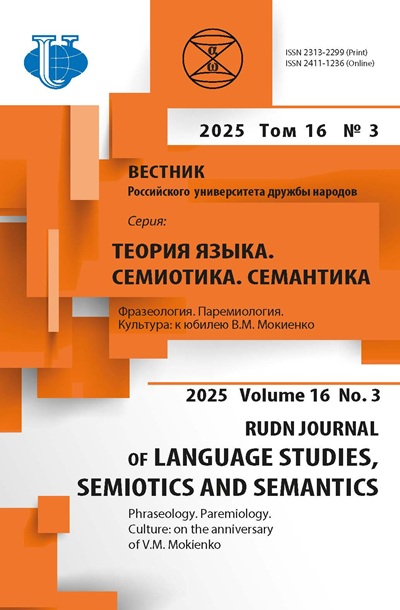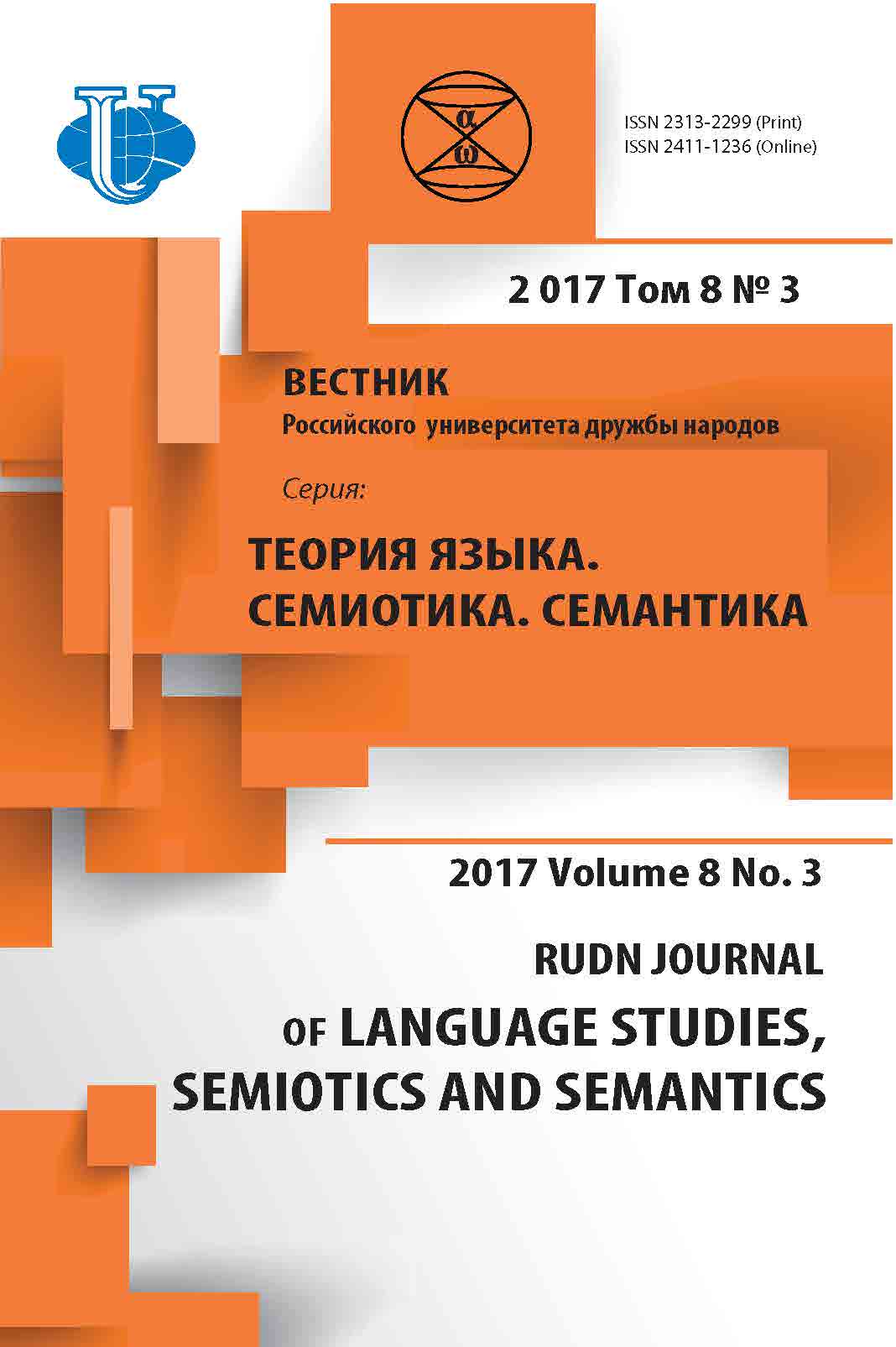ПРИНЦИПЫ СИСТЕМНОЙ ТИПОЛОГИИ В ОТНОШЕНИИ К КАТЕГОРИИ ДАТИВА
- Авторы: Чернышев АБ1,2
-
Учреждения:
- Закрытое акционерное общество «ВолгАэро»
- Городской общественный научно-экспериментальный фонд «Языковая среда»
- Выпуск: Том 8, № 3 (2017)
- Страницы: 543-553
- Раздел: СТАТЬИ
- URL: https://journals.rudn.ru/semiotics-semantics/article/view/17015
- DOI: https://doi.org/10.22363/2313-2299-2017-8-3-543-553
- ID: 17015
Цитировать
Полный текст
Аннотация
В статье систематизируются основные принципы системной типологии, заложенные Г.П. Мельниковым и ставшие методологической основой настоящей работы. Важность понятия внутренней детерминанты языка обусловливается употреблением разного класса морфем - предлогов, префиксов и аффиксов - в языках разных типов при актуализации универсальной стратегии. Принцип триадности в отношении лингвистического анализа был спроецирован на категорию датива, который понимается с точки зрения стратегии, выводимой через универсалии естественного семантического метаязыка. Актуальность исследования определяется недостаточной изученностью аспекта датива с позиции системной типологии. Объектом исследования являются предложно-именные и глагольно-префиксальные конструкции, в которых актуализируется универсальная падежная концептуальная основа датива, в русском, английском, французском, испанском и узбекском языках. Предметом исследования выступает семантика морфем при, to, à, a, -ga в русском, английском и французском, испанском и узбекском языках как модель универсального падежного значения датива. Проведенный на материале художественной литературы пяти разноструктурных языков анализ показал особенности актуализации стратегии через языковые единицы - морфемы. Основные используемые в работе методы включают абстрагирование, анализ, синтез, аналогию, когнитивно-коммуникативный и типологический методы, а также методику морфотемного анализа и когнитивного моделирования. В результате было установлено, что морфемы to в английском языке, à во французском языке, а в испанском языке, при- в русском языке, -ga в узбекском языке являются маркерами датива, модифицирующими данную падежную категорию в зависимости от вектора развития собственной семантической структуры.
Ключевые слова
Об авторах
А Б Чернышев
Закрытое акционерное общество «ВолгАэро»; Городской общественный научно-экспериментальный фонд «Языковая среда»
Автор, ответственный за переписку.
Email: alexeich_78@mail.ru
Чернышев Алексей Борисович, кандидат филологических наук, старший переводчик ЗАО «Волг- Аэро» (г. Рыбинск), руководитель проекта ТИПОЛОГИЯ при Городском общественном научноэкспериментальном фонде «Языковая среда» (Рыбинск); научные интересы: лингвистическая типология, компаративистика, семантика, морфология, терминология, переводоведение
проспект Ленина, 163, Рыбинск, Ярославская область, Россия, 152903; ул. Пушкина, 53-100, Рыбинск, Ярославская область, 152934Список литературы
- Вежбицкая А. Семантические универсалии и описания языков. Москва: Языки русской культуры, 1999.
- Зубкова Л.Г. Общая теория языка в развитии. Москва: РУДН, 2003.
- Зубкова Л.Г. Принцип знака в системе языка. Москва: Языки славянской культуры, 2010.
- Климов Г.А. Принципы контенсивной типологии. Москва: ЛИБРОКОМ, 2009.
- Кошевая И.Г. Проблемы языкознания и теория английского языка: Части речи и категории. Теоретический курс. Москва: ЛИБРОКОМ, 2012.
- Ломоносов М.В. Российская грамматика. Санкт-Петербург: Императорская Академия Наук, 1755.
- Мельников Г.П. Принципы и методы системной типологии языков: дис.. д-ра филол. наук: Российский университет дружбы народов. Москва, 1990.
- Мельников Г.П. Системная типология языков: Принципы. Методы. Модели. Москва: Наука, 2003.
- Мельников Г.П. Системная типология языков: Синтез морфологической классификации языков со стадиальной. Москва: ЛЕНАНД, 2014.
- Нисский Григорий. Об устроении человека. Москва: Типографія В. Готы, 1861.
- Condillac E.B. de. Essai sur l’origine des connaissances humaines. Режим доступа: http://classiques.uqac.ca/classiques/condillac_etienne_bonnot_de/essai_origine_des_connaissances/ condillac_origine_des_connaissances.pdf. Дата обращения: 18.11.2015.
- Croft W. Typology and Universals. Cambridge: Cambridge University Press, 2003.
- Rousseau J.-J. Essai sur l’origine des langues. Режим доступа: http://classiques.uqac.ca/classiques/ Rousseau_jj/essai_origine_des_langues/origine_des_langues.pdf Дата обращения: 18.11.2015.
Дополнительные файлы












